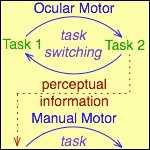NSF Grant to Hornof to Advance a Scientific Understanding of Multitasking

The National Science Foundation (NSF) has awarded Associate Professor Anthony Hornof $500,000 to advance science through a project entitled "A Computational Theory of Perceptual Integration in Multimodal Multitasking". The project investigates how people integrate auditory and visual information to perform multiple tasks in parallel, such as when emergency personnel interleave navigation and communication tasks with the life-critical task of driving. The theory will advance scientific theory and also provide a practical theoretical framework that can be applied immediately to the design of safer and more reliable systems for in-car navigation, emergency vehicle dispatching, and air-traffic control.
"This is a really great opportunity to advance science and benefit society at the same time", says Dr. Hornof. "The project is particularly exciting because it integrates computational science with other disciplines, primarily experimental psychology, to answer really important questions that could not be answered without these bridges across the disciplines." The project will build directly on recent eye tracking and cognitive modeling research conducted by Dr. Hornof and his Ph.D. student, Yunfeng Zhang, that has been well-received at conferences such as CHI 2010, the top international conference on computer-human interaction. The award (IIS-1017593) was made by NSF's Human-Centered Computing Program with Dr. Hornof as the sole principle investigator.
More information on this and other exciting human-computer interaction research projects underway at the University of Oregon is available at Dr. Hornof's Research website.